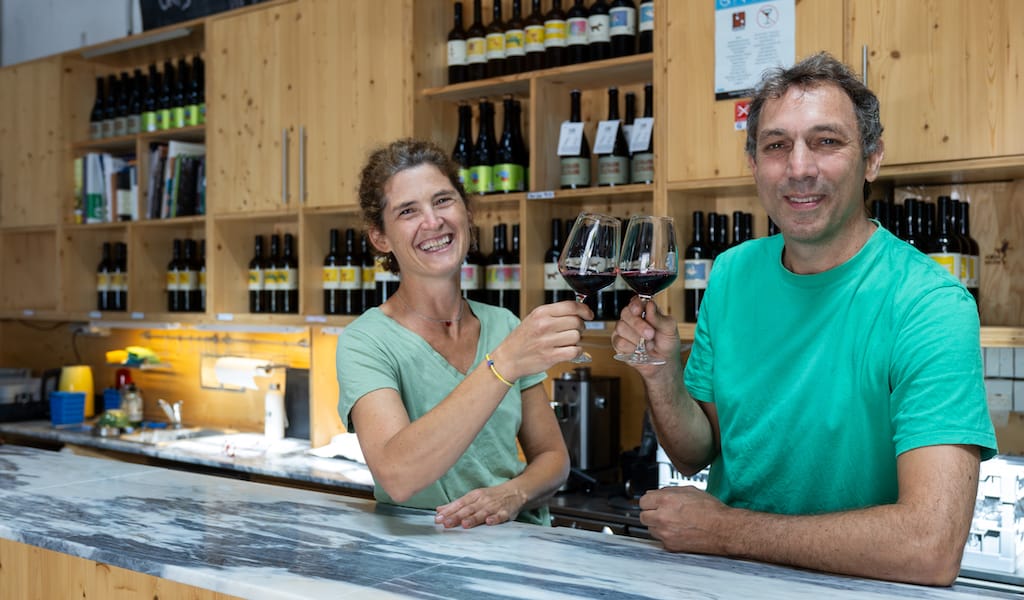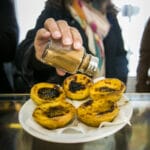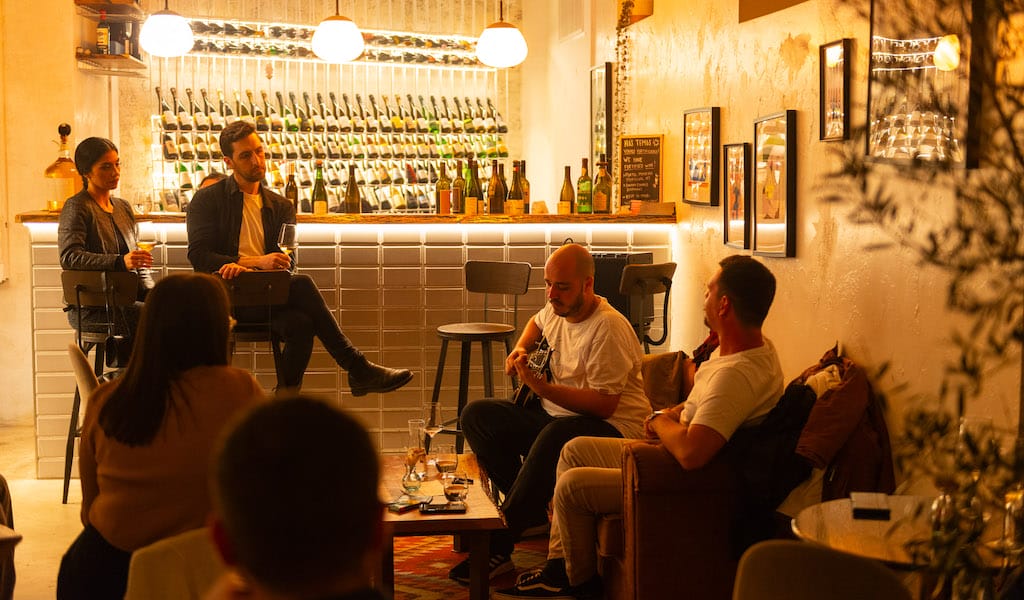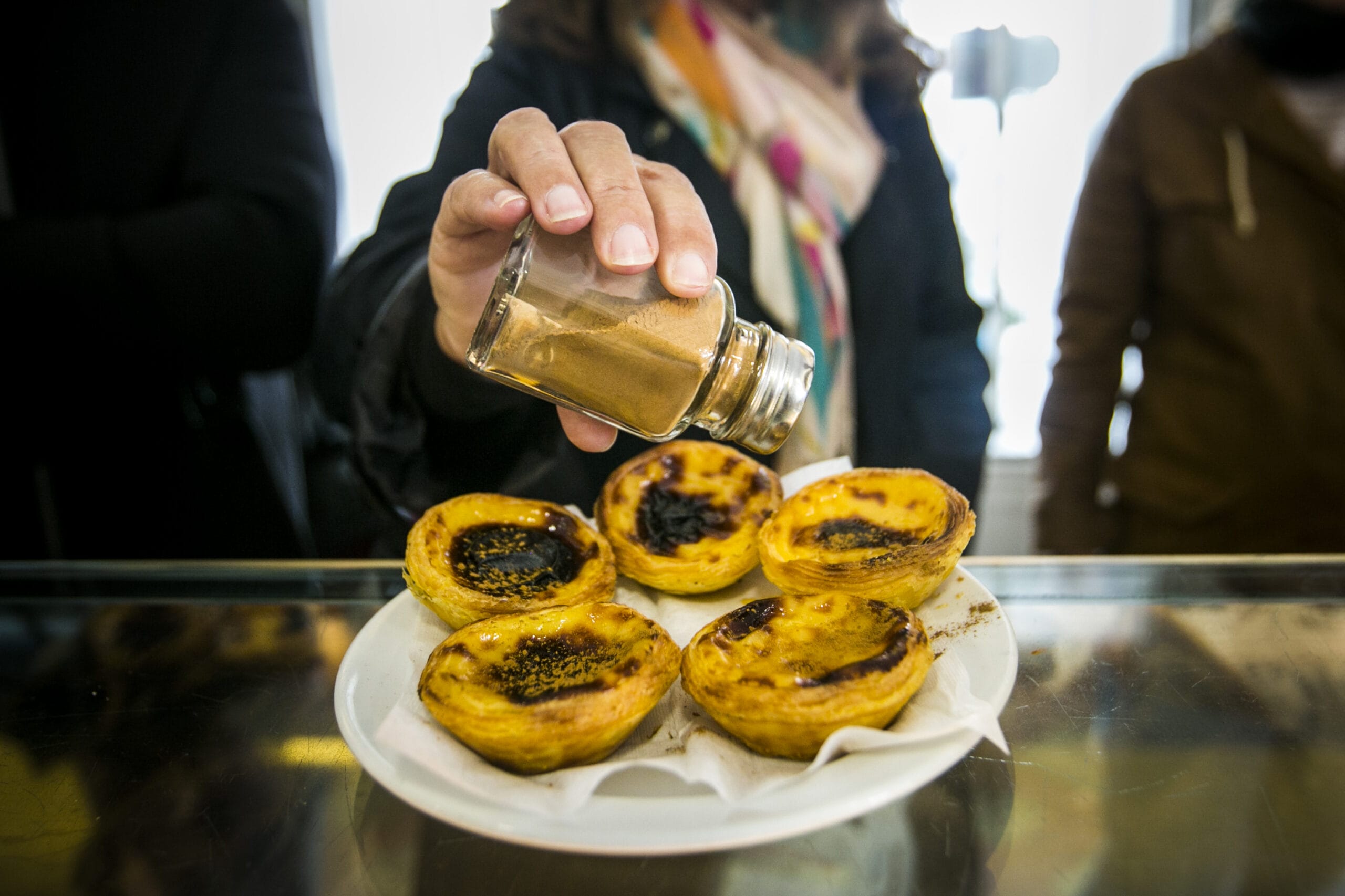Unlike most capitals, Lisbon has vineyards within its territory, and plenty of vines within reach in neighboring municipalities, from Sintra to Cascais and Loures. But until 2020, there wasn’t a single winery to be found in the city itself. Adega Belém has remedied this. Located right at the edge of one of the city’s most visited neighborhoods, where tourists line up to see the Belém Tower or eat Lisbon’s most famous egg tart, The winery’s unusual location – occupying a former garage in the backstreets – is a peaceful antidote to all the queues.

Upon arrival, we’re greeted by Lili, a friendly brown labrador. She has a red wine named in her honor but we’ve already fallen in love with her even before learning that. Lili takes us to meet Catarina and David, the couple whose vision of producing wine in the city made Adega Belém a reality. Prior to this venture, they both had careers in academia, and left jobs at universities to dedicate themselves to wine. Catarina, from Lisbon, is a biologist, specializing in frogs (which explains Adega Belém’s crawling toad logo). David is from Frankfurt, and worked as a professor of anthropology.

The two met when Catarina was finishing her PhD at the University of Lisbon and David was working as a researcher. Disillusioned with academia and long curious about winemaking, they decided to take a chance on a career change. To break into the wine world, they started from scratch and became students again. Both studied oenology for two years in Lisbon and then one more year in Germany. They then moved to Switzerland, where David went back to teach at a university in Lausanne and Catarina worked as a winemaker.
During this period, the couple visited many wineries, and were inspired by interesting urban wine projects they saw in different countries – something that didn’t exist in Lisbon. What they saw here in Lisbon were many grape growers but surprisingly few wine producers (the Lisbon region has 2,200 growers and only 125 wine producers). In fact, a lot of wine is still sold in bulk, a consequence of the laws and systems of the Estado Novo (the dictatorship regime that lasted for 48 years) which even had a slogan that insisted that “to drink wine is to feed one million people in Portugal.” Mass production of wine was encouraged during this time, without much focus on quality.

Catarina and David longed to return to Lisbon, and in 2016 they found themselves with the opportunity they had been hoping for. “We saw this garage being advertised and we decided to go for it. It was perfect for our work.” The two embarked on a long journey to outfit the space for producing wines, and in 2020, despite the Covid-19 pandemic, were finally ready to open.

Adega Belém produces low-intervention wines with local grapes. Even during our visit, a family came in to inquire about selling grapes to the winery. “We know the producers we’re getting the grapes from,” says Catarina. “For instance, regarding Carcavelos wine [a delicious dessert wine], we buy grapes which belong to the Patriarchate of Lisbon from the Seminário de Caparide [a seminary in Cascais], and fortify the wine there. To be called vinho de Carcavelos it has to have been fortified in the area and then it has to be aged here for two years in wooden barrels, plus six months in the bottle.” This is just one of the many special wines produced here in Belém, out of a total of 14.

David and Catarina get their white grapes From Tapada da Ajuda, a green space in Lisbon where the Instituto Superior de Agronomia (University of Agronomy) has vineyards for research. The reds are sourced from the northeastern municipality of Alenquer. The moscatel graúdo, another white grape, comes from the region of Palmela, Quinta do Piloto, and is used to make the talha (amphora wine, fermented in clay vats) called Unicórnio. The sparkling espumante is produced with red grapes from Caparide. David and Catarina are involved in the process of picking the grapes which are then brought to Belém where fermenting, aging and bottling all happen on site in the winery. The couple takes two months out of the summer to join producers in the various vineyards from which they source. In 2023, they started on July 25 and worked in the fields up through the middle of September.
David and Catarina then settle into the winery, perfecting and crafting their wines, using as few chemicals as possible. “The idea is to use what we know from science, but we’re lucky that the grapes we get are of very high quality so we don’t need to correct acidity. We do everything with spontaneous fermentation, bringing more complexity to the wines,” adds Catarina. Some of the whites are vinified with skin contact during fermentation and get the beautiful color of amber wines (curtimenta in Portuguese, “orange” as they are often referred to these days). For David, the idea is not necessarily to have a natural wine profile: “[The goal] is to have a good wine, a more interesting wine; more handcrafted.”

Adega Belém wines, with their funky labels and irreverent spirit, can be found in a handful of restaurants and wine shops in Lisbon. The duo is also exporting to some European countries, with distributors in England and Germany, and shipping orders internationally. If possible, though, we recommend a visit to the winery itself. Open on Thursday, Friday and Saturday, a lovely bar right at the entrance welcomes guests who want to taste the wines along with cheese and charcuterie. It’s also possible to book a visit to the winery and learn about the process alongside the winemakers. At the end of the garage-turned-winery lies a closed room with controlled temperature and light. It served as the former painting station for the car repair service, all covered in tiles. But instead of the smell of paint, it now swells with the far more interesting aroma of oak wine barrels.
Published on March 13, 2024
Related stories
April 10, 2024
LisbonIt was an unusual night. But Black Sheep is, admittedly, an unusual venue. Lucas Ferreira, one of the co-owners of the Lisbon wine bar, had pulled out a guitar and was engaging in a jam session with a former bandmate. For a good 45 minutes, the normally buzzy bar was on pause: the chatter had…
April 4, 2024
LisbonQuick Bite: On this food tour in Lisbon, we’ll experience a cultural feast, tasting some of the most diverse bites of the city’s gastronomy and meeting the people behind them. The oldest city in Western Europe, once the hub of a trading empire that connected Macau in the east to Rio de Janeiro in the…
August 28, 2023
LisbonYou don’t have to look far to find a glass of wine in Lisbon. But a unique glass of wine – perhaps something made by a small producer, or a bottle from an obscure region – in a comfortable or perhaps even trendy atmosphere, poured by someone who can explain what you’re drinking? That’s where…























































































